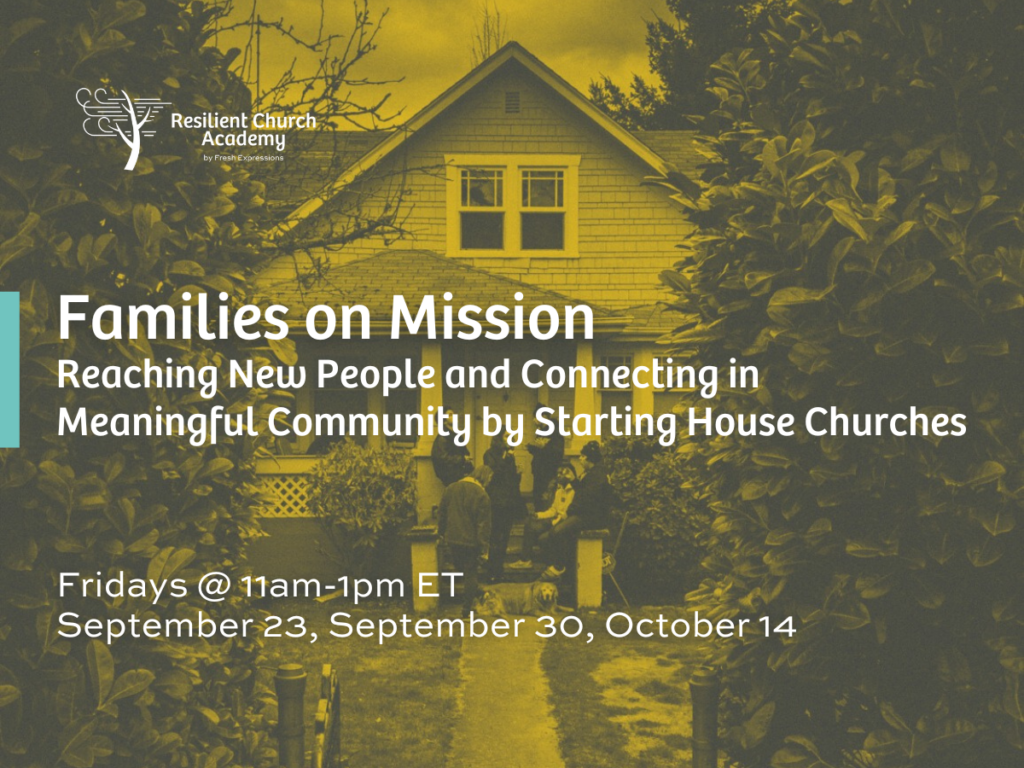House Churches are both a fresh and ancient method of living out the church. But they also address common difficulties churches and their members face.
Difficulty #1: Finding Vocation in Family-Community
It’s easy to hear the term “house church” and get caught up in the location where the church is meeting. But a “house” or “household” is also a word for “family” and “community.” Living in and leading a house is an experience of “vocation.”
“Vocare” is the root of the word for “vocation” or more commonly, ‘calling’. To know our calling we must know the caller. In the ministry of Fresh Expressions, we always start with a posture of listening. By listening we discern our calling.
The life and writings of Frederick Buechner impacted a good many people. With Buechner’s recent passing, I’ve seen my social media feeds filled with remembrances of the impact of his writing. One Buechner quote that has gained broad appeal over the years comes from his rumination on vocation. Vocation, he said, is where our deep gladness and the world’s deep hunger meet.
Once I was counseling a young couple who was preparing for marriage— and Buechner was the groom’s favorite author. Dave, the groom, had never met Buechner, but on a whim sent him a letter asking if Buechner would compose a prayer of blessing to be read over him and his new bride at their marriage ceremony. A few weeks later, Dave received a personal reply from Buechner with a prayer of blessing enclosed. I like to think that the blessing helped seal Dave’s calling to marriage.

Most people have a desire to live out a calling. But too often, we limit our imagination for this to having the perfect job or career. In the early days of our relationship, my wife and I sensed that we weren’t just interested in marriage, we were being called to marriage. Marriage is a vocation. So we resolved not to keep our marriage to ourselves but to share our deep gladness as a couple with others.
Along the way, we have met people hungry for family and community. Over several years we began to see how we could be a nurturing presence to everyone we meet and how our home could be an antidote for those who were looking for a family like community but who were far from God. When we could not have our own children, we had to develop an understanding of marital fruitfulness that went beyond childbearing and child-rearing.
This journey helped us to start thinking of our “house” as a “little church.”
Since our true home is found in God, we wondered how our marriage and home might become an avenue to help us and others get there. At the time, we were ministering among college students and young adults. Many of them came in and out of our home on a regular basis. Then when the COVID-19 pandemic hit, our home became our primary place of ministry. Initially, we started gathering on our front porch in groups of 10. The house church grew and multiplied. Even after restrictions around gathering loosened, our home continued as our primary place of worshipping together with a combined monthly gathering of several house churches.
Understanding our marriage as a vocation led us to invite others into our lives, not just as friends, but as spiritual parents, siblings and children. As followers of Jesus, it was only natural to develop rhythms of worship with those who had become part of our family-community.
Difficulty #2: Heavyweight Church Programming
Like many ministry settings, our ministry with college students had become reliant on running programs and events at a central location. This ministry approach required more and more volunteers to meet the demand. We had strategy sessions with our leaders about what to cut. But no one wanted to give anything up.
The forced slowdown required by the pandemic meant that we couldn’t do big events that required lots of heavy lifting. We couldn’t do everything we were used to doing. We had to go small.
The model we adapted for our house church was lightweight. With some preparation, it didn’t require lesson planning, worksheets, bulletins, slideshows or even a sermon. This worship space in our home also became a place of rest. Our community talked about the importance of Sabbath for years, but our house church gathering became an opportunity for practicing Sabbath together.
We also saw people grow in their faith, not because we were inviting them into a program, but because we were inviting them into our life. Those on the outs with their impression of church because of bad experiences with authoritarian leaders found a thick community where everyone could participate. Those with little or no experience in church found an accessible and relational approach to life with Jesus.
Difficulty #3: Problems that require a Family
In my book Bringing Church Home, I introduce readers to an Italian priest named Renzo Bonetti. He taught us the model that we adapted for use in our gatherings. Bonetti says that the family is the solution to the problems that ail so many of us.
We began to see this as we adopted new people into our little family. Many church structures separate people. Married people are separated from those who are single. Those who have children are separated from those who don’t. But the Church is meant to create a new kind of family. In this family, single people learn how to alleviate the burden of child care faced by young families. Older adults help mentor and guide younger adults. And children and teens learn to find their voice.
The family-like community created in the house church setting became an avenue on which to meet other people and other needs. Several in our community signed up to play soccer and volleyball at a local recreation center. The connections made there led several new people to become part of a house church. Another time we learned that the sister of one of our friends had been in a serious accident and needed financial assistance with medical care and the group met the need.
These little family-like communities share groceries and yard tools. They take turns helping facilitate our larger gathering. It’s simple, really. None of this is rocket science. Nearly every church does these kinds of activities— the key to the house church though is the being intentional with proximity to regular life. In a home, you’re less likely to hide. In home, it’s life up close as the life of the family creates a little bigger family as we all anticipate the great big family of God.
Any congregation can start a house church
Every family is a little church. In a day and age where we’re not always sure about our evangelism strategies, families-as-church become the evangelism strategy as they model a life of giving and receiving the love of Jesus with everyone they meet.
A few months ago, I accepted a call to a nearly 125 year-old church in part because it had already begun developing a neighborhood network of home-based gatherings for those who were not yet part of any church. Where our Sunday morning gathering (in a breathtaking space with stained glass) reaches a couple hundred people a week, the neighborhood network reaches another 60-70 people most of whom wouldn’t come to our Sunday morning worship gathering.
I foresee a day when the neighborhood network expands our reach by the hundreds. Some of those will make their way to our Sunday gathering and become more involved in the central operations of the church. We’re already seeing this because of the stability that the inherited church structures provide to young families. Some will consider the house church their primary gathering. The truth is, we need both—and more–modes of gathering and building community to model our common life together.
All of it for Jesus’ Kingdom.


